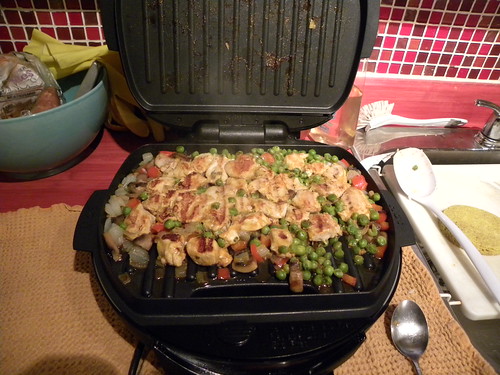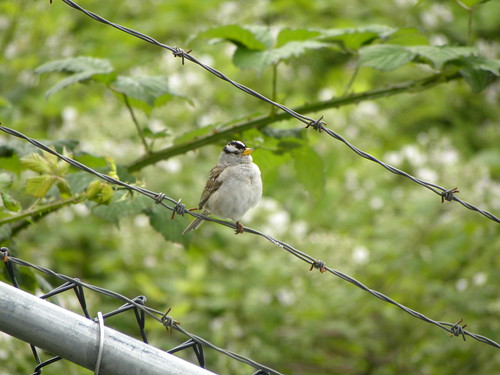As a few of you may have seen, I occasionally Tweet at the end of my work day about whatever dinner I’m putting together. A few weeks ago, this behavior triggered an @reply from a buddy who lives in Burnaby: “Do you live so well because of where you live? Sometimes the suburbs are a pain.”
I’ve been stirring through possible responses ever since. I wondered how gourmet those posts of mine sound, when much of what they boil down to is stew, salad, bread and leaves out of a box. I pondered what my lifestyle looks like through that little Twitter window. Is it fabulous and opulent, in a Martha vein? No idea.
In some ways, the answer to the question is yes, absolutely. You should all move to my wonderful urban neighborhood! That particular day, I had deli cheese from La Grotta del Formaggio, and bread from Fratelli‘s. The two are next door to Cafe Calabria, where I write so much of my fiction. More days than not I’ll pack up the writing, hit the Cave o’ Cheese and/or the bakery, run from there to the supermarket, and be at Chez Dua fifteen minutes later with dinner in my backpack.
If it were the case that I had no dinner plan at, say, three in the afternoon, I could run out the front door, hit the same places, and still have meal components in time to cook. That’s a definite neighborhood perk–especially since I don’t drive. But as it happens, that kind of scrambling rarely forms part of the equation. It’s timewaste-y, and like most of us I consider my minutes precious.
I don’t often notice it, but a lot of thought and energy go into my approach to fud*. In writing this, I’ve realized I go at food in much the same way I tackle writing. I leave the house every morning knowing what fiction I’m going to work on, and I often leave knowing what I’m eating from dawn to dusk. In my wallet is the list of whatever the grocery gods need to provide to make that happen.
It’s important to me that ![]() Kelly and I aren’t screaming around at six, hungry, exhausted, trying to figure out supper and eventually settling on whatever’s fastest or closest to hand, even if it’s overly pricey, or not all that good for us. K is working the full-time job that makes it possible to do this with relative ease, to provide food that’s healthful, tasty and affordable. My doing so ensures that we aren’t eating take-out five nights a week or getting home at six, cooking until seven, and eating and cleaning up until eight. But–as every parent and homemaker knows–getting quality food on the boards, day after day, is no wee task. It is, in fact, something you can easily burn out on.
Kelly and I aren’t screaming around at six, hungry, exhausted, trying to figure out supper and eventually settling on whatever’s fastest or closest to hand, even if it’s overly pricey, or not all that good for us. K is working the full-time job that makes it possible to do this with relative ease, to provide food that’s healthful, tasty and affordable. My doing so ensures that we aren’t eating take-out five nights a week or getting home at six, cooking until seven, and eating and cleaning up until eight. But–as every parent and homemaker knows–getting quality food on the boards, day after day, is no wee task. It is, in fact, something you can easily burn out on.
Doing it, keeping it going, and not getting bored or burned out, takes time and focus and… really, all the same things that writing discipline requires.
So, yes, my neighborhood’s location is choice. But I can’t ever imagine letting the food slip too far down the priority stack. Even when K and I both nine to fiving it, we managed to cook most nights. We gave up that couple of hours I mention above; we were also younger, and considerably more peppy. Still, I can imagine Alternate Us as a car-driving Dua, living in the wilds of the Lower Mainland, hitting the grocery hard every couple of weeks with a meal plan and a long list. It wouldn’t be market shopping, but even the Hinton IGA has boutique breads, olives and cheeses these days. It would be a pain to run out of things suddenly–to not have the 24-hour grocery two blocks from home, so close I call it “my pantry”–but I suspect we’d learn how to avoid such emergencies.
As for boredom… I don’t make a big cooking effort every single day. I have become a fan of the pre-washed boite of salad leaves. In wintertime, I make big batches of our favorite soups and freeze them in easily reheated portions. I read a McLeans article once that claimed the average Canadian family only had five stand-by recipes to draw from in a cooking pinch. I can beat that easy, I thought. Now I make a conscious effort to increase my repertoire of basic meals, the things I can make in under an hour, by three or so recipes a year. Since not all recipes are made of win, this generally means trying out something new every four to eight weeks. Not too onerous.
But challenges crop up. Routines get busted. (See, it is just like writing!) This year, spring sold out and extended its run for bleeping ever. It was cold and dark and rainy out, and I didn’t switch to our summer fare as early. All my new recipes, meanwhile, were winter things. I sensed a rut coming on…
… so I splashed out on a countertop grill and started experimenting with meat cuts and even stir fries:
Now I’m playing with grilling veggies and pre-skewered kabobs. Kelly made an amazing grilled cheese sandwich on sourdough bread (quite a light one, incidentally) with a filling of caramelized apples and onions.
My neighborhood is foodie paradise, no doubt about it. You really can amble down the Drive and grab dinner fixings in twenty minutes. But it’s just as easy to go a block, feeling all hungry and too tired to cook, and know that your evening won’t start until 7:30 p.m. or 8:00 p.m. if you do, and then end up in a one-slice pizza place. I try to regard that as a last resort. I’ve bent around the Drive’s abundance and convenience in a way that works for me… and I hope that if we end up in Bugeye, Saskatchewan one day, it won’t change what I eat.
Do you live so well because… is a huge question. It made me appreciate my neighborhood and my lifestyle anew. It made me think about how finely tuned some aspects of my schedule are. It made me worry that if I posted this I’d sound terribly pompous. (Why yes, I do live well, thank you so much for noticing!)
Mostly, it made me realize that the thing I really associate with living well on the Drive isn’t about groceries but about people. Ten friends within easy walking distance. Roots in the neighborhood that mean I get to say hello to some acquaintance on practically every walk to the Skytrain. The Parade of Lost Souls and the recent spate of soccer parties and the hairdresser with her growing kid and all the people who’ve been selling me cheese and bread and cat fud for nigh on twenty years. Marco, at Fratelli’s, made the cake for our legal wedding. The patriarch of the cafe, who gives me unsolicited fatherly lectures on… actually, on living a good life.
As for Wednesday night’s dinner? Grilled buffalo steak… imported from a grocery in Yaletown.
_________________________
*If you’re thinking Fud is a typo, look here.





